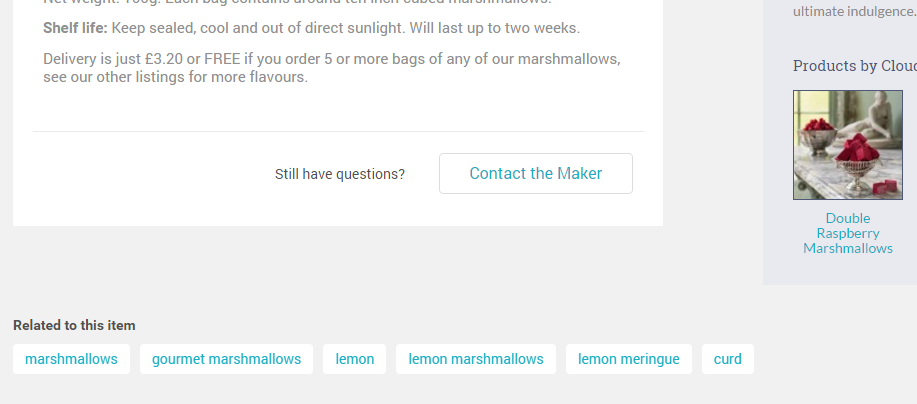
Why keywords matter
Think of keywords as phrases that customers use to search for a product like yours. The presence of keywords in your product listings help determine whether your products appear in relevant search results - both on Yumbles but also in search engines like Google that we feed your products into as part of our Yumbles marketing.
If a potential customer is searching for "vegan snacks" - product listings that contain the keyword "vegan snacks" are more likely to be shown than those without it.
How to use Keywords
Ensure you maximise the visibility of your product listings by making sure you have:
- The most important keyword in your product listing title
- A few of the most important keywords in your listing descriptions
- All relevant keywords in your tags
First, identify your Keywords
As mentioned above, keywords are phrases that buyers are likely to use to search for products like yours. They are specific.
The best keywords are those that best describe either a) what your product is or b) what it is used for.
Crucially you want to focus on the phrases that are used the most by people looking for items like yours.
If you make raw chocolate bars but few people search for "raw chocolate bars" then you might also want to make sure you include the keywords "vegan chocolate" and "dairy free chocolate".
Start by making a list of all relevant keywords (search terms) you believe are relevant to your product and you want to target. Aim for at least 5.
Include the most important keyword in your listing title
First and foremost your listing title has to be clear to customers what the product is that you are selling and be easily readable and scannable. So you won't want to add numerous keywords here (also search engines like Google won't like it).
Just make sure that the most important keyword (search term) you are taretin is included in your product listing name.
For example if you have a hamper, for sure you will want to have "hamper" in your listing title (don't just call it "The Big One") but as that is so broad, even more effective can be to have a more specific phrase depending on the nature of your hamper and it's primary purpose - for example "vegan hamper" or "birthday hamper" or "gin hamper".
Add your target keywords in your listing descriptions
Where you can, try and include at least some of your most important keywords in your listing descriptions. But take care - your listing descriptions need to be above all well written, easy to read and give the customer the info they need to know to decide to buy so you don't want to add lots of phrases randomly to the description. And never insert a list of keywords - this is known as keyword spamming and search engines don't like it.
Add your target keywords as Tags
The final place where you can add your keywords - and all of them - is the tags in your listings. Do this on the “Tags” tab you will find within each editable listing on the Products page.
Do's and don'ts for choosing keywords:
1. DO consider popular names and synonyms for your type of product
For example: "raw chocolate", "artisan chocolate", "dark chocolate"
2. DO consider the keywords focused on the main use cases/ category types for your product
For example: "wedding favours", "snacks", "Christmas cakes", "birthday gifts"
3. DO consider special diet keywords, if that is what you are targeting
For example: "dairy free chocolate", "paleo chocolate", "gluten free gifts"
4. DO check and see what other similar products are tagged with
Pick up on any other terms you may have missed by checking out similar products.
5. DON'T tag with adjectives
People don't search using just an adjective like "luxury", "delicious" and "tasty" so don't add them as a tags!
6. DON'T add irrelevant or tenuous keywords
Not all visibility is good visibility. If you tag your product with irrelevant tags, your product will appear in search results where it will have a very low click rate (conversion). That will only penalise your product in the long run. Make sure that the tags you choose are highly relevant to your product.
An example of a tenuous tag is "chocolate" for a vegan chocolate cake. Yes it contains chocolate but most people searching for chocolate won't be looking for a vegan chocolate cake so they're unlikely to click to view yours. Much better tags for such an item would be "vegan cake", "vegan treats", "vegan chocolate cake", "dairy free cake" and so on.
7. DON'T add hundreds of keywords!
Search engines won't like it. Choose up to around a maximum of 10 of the most relevant tags for your product.

Comments